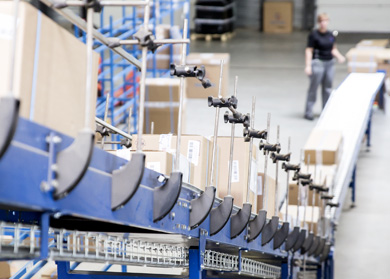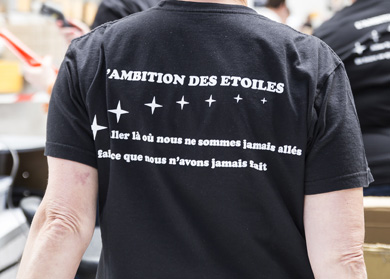OUR CSR COMMITMENT : ENVIRONMENTAL, SOCIAL AND SOCIETAL

The company of tomorrow will have to face new challenges in a world where everything is changing and where change will be increasingly rapid. In this context, the ambition of the Matfer Bourgeat Group is to work actively to pursue its development, paying particular attention to its environment and demonstrating its social commitment on a daily basis.
In this approach, we will ensure that we increase the coherence of the teams and offer each one the means to realize their skills and creativity.
Sustainable development must therefore permeate the entire group: the projects, the men and women who carry them out and the relationships built with our customers.
Patrice Mora, President of the group
The metallurgy sector is one of the largest consumers of natural resources and energy. We consider that it is our responsibility, at our level, to limit the impact of our activities in order to ensure a future for new generations.
Since 2014, we have increased our corporate social responsibility (CSR) actions around the 7 axes of the ISO 26000 standard: Governance, Human Rights, Labor Relations and Conditions, Fair Practices, Consumer Issues, Communities and Local Development and Environment.

OUR CERTIFICATIONS
These are our guides and tools for day-to-day management in some of the group’s companies to carry out our programs and missions.
Management certifications

In March 2021, the ISO 45001 standard will replace the OHSAS.The Matfer factory embarked on the adventure. The aim is to achieve better risk management in order to reduce the number of accidents, comply with legislation and improve our performance.
OUR COMMITMENT to the environment
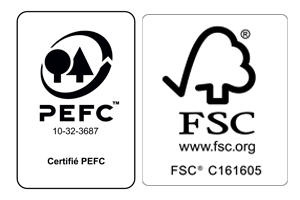
The state of the forest and its resources is also a concern of the Matfer Bourgeat Group. It was therefore natural for us to approach the FSC®* and PEFC* organizations, which offer a credible solution to complex environmental and social problems. Thus, by choosing our FSC ®* or PEFC* certified products, our customers contribute to the preservation of some of the planet’s forests.
*FSC-C161605, PEFC/10-32-3687
Our commitment to food hygiene

Obtaining the NF mark is a process decided by the company. This mark, recognising quality, is awarded to products by AFNOR based on their compliance with French and European technical standards and specifications.
The NF mark guarantees that you are buying products that comply with regulatory requirements.
Some of our products have been awarded the NF Food Hygiene mark, issued by AFNOR Certification 11, avenue Francis de Pressensé – 93571 Saint Denis La Plaine Cedex. www.marque-NF.com. This mark certifies compliance with standard NF 031. The certified characteristics are equipment cleaning and suitability for their intended use. The products awarded this mark are identified with the NF pictogram.
Our certifying bodies: Afnor, Bureau Veritas, Ecocert, NSF
our achievements
Change in GMB CO2 emission indices for employee travel
Trends in cardboard and plastic weight indices relative to number of shipments
- Reducing pollutant emissions that contribute to climate change : now a priority in every company’s environmental policy.
- Reduce greenhouse gas emissions from products put on the market.
- Investments in de-oiling machines.
- Limiting over-packaging of orders to reduce the impact of our deliveries on biodiversity, one of our ” Major challenges “.
- We offer our customers products with a “lower environmental impact”, and this number increases every year. Some of them have been awarded an environmental label: FSC, PEFC, AB, European Label, Black Swan, etc.
- Increase the recycling of waste, in particular electrical and electronic equipment (WEEE) and furniture (WEEE) placed on the market (from products placed on the market and internally).
- Reduce the impact of consumption (of products sold and internally).
- Cost reduction actions
- Constantly adapting to the market
- Preserving the strong brand image of products
- Proactive investment programs
- The GMB Group’s Code of Ethics sets out guidelines for behaviour, fair business practices and partnerships.

- Respect for human rights, particularly those of children, with suppliers via the CEA purchasing group and its Responsible and Vigilant Purchasing program.
- A Code of Conduct is signed by suppliers, with audits for some of them.
- 4 annual sales of the Group’s products attract visitors and contribute to the vitality of the regions where our products are sold.
- Support for the personal commitment of employees volunteering for “e-volunteering” or Congé Solidaire® with the Planète Urgence association, whose aim is to help local associations involved in economic development, individual training or wildlife conservation.
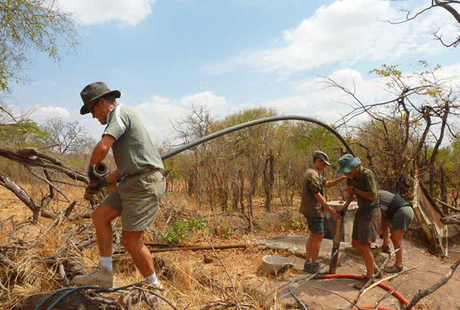
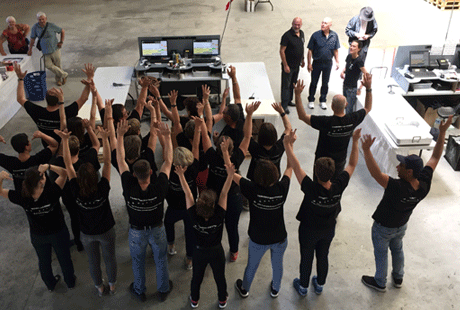
- Annual occupational risk reduction plan
- Reducing the drudgery of work
- Developing versatility
- Action plan to reduce workplace accidents and occupational illnesses
- Staff training plan
- Teamwork development
- All employees are offered benefits or facilities to improve their daily life and quality of life at work (QWL).
- Creation of a collaborative corporate network (RCE) enabling employees to exchange in real time and work collaboratively thanks to digital technology. Employees are surveyed and CSR awareness is raised on a regular basis (annual sustainable development mobilization week).
- Introduction of an Ethics Charter: governing employee relations and working conditions
